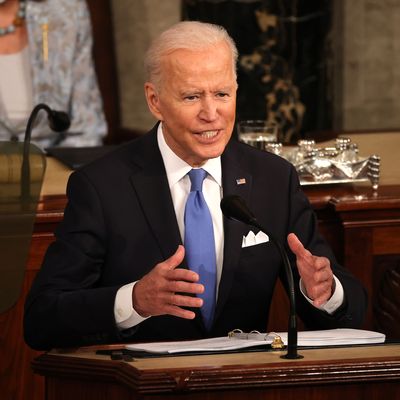
On Wednesday night, President Biden gave a speech that covered a lot of policy ground. I spoke with staff writer Sarah Jones about what Biden didn’t address, why the Republican response to his policies is so muted, and more.
Ben: During President Biden’s not–State of the Union speech on Wednesday night, he outlined a bold economic agenda for the coming months. A key element is the just-unveiled American Families Plan, which would use tax increases on the wealthy to fund a broad range of social programs, including family leave, preschool education, and more, dramatically reshaping the role of government in a lot of Americans’ lives. What do you make of this plan and Biden’s selling of it?
Sarah: If Biden really does want an FDR-size presidency, this isn’t a bad way to start! The American Family Plan would just about bring the U.S. to the standard set by other industrialized nations on issues like family leave — and thus for the left, it’s useful. Biden reminded us publicly how far behind other nations we really are on matters that ought to be considered basic rights. But complications loom. His presentation, in Wednesday’s joint address, is entirely in keeping with the version of Biden we saw on the campaign trail: He says he is committed to a kind of New Deal liberalism and bipartisanship at the same time. We haven’t seen anything from the GOP that suggests they’re going to make a good-faith effort to respond to the American Family Plan with workable ideas of their own. Meanwhile, Biden still has to contend with conservative members of his own party. It’s interesting that he essentially called them out on Wednesday night; we’ll see how they respond.
Ben: From your perspective, which specific policies in Biden’s plan are the biggest deals? It’s quite probable that the package will be pared down or split off into smaller pieces to get it through Congress. If that happens, what should Democrats fight hardest to keep?
Sarah: Well, there’s a lot to choose from. But the policies on family leave and child-care support would remedy serious economic and gender inequities and they deserve the Democratic Party’s full support. It’s a lot harder to say whether they have a realistic chance of getting past conservative Democrats like Kyrsten Sinema or Joe Manchin, because neither really has a coherent ideology beyond an apparent commitment to Senate norms.
Ben: Were there any conspicuous omissions from Biden’s speech, in your view?
Sarah: Unless there’s something I missed, we didn’t hear about student-debt relief last night. Maybe the administration didn’t think the subject was germane to the American Families Plan, but as the plan does include proposals to make education more accessible and affordable for students, it would have been nice to find out where the White House is, exactly, on that issue. (The explanation is probably that they just don’t have a position right now.)
Ben: I don’t know if you caught Republican Tim Scott’s response to the speech, but he spent a lot of time on other issues — like voting rights — and not so much time attacking Biden’s really consequential economic proposals. It seems safe to say that the GOP won’t be coming along on this bill, just as they didn’t with the stimulus package Dems passed a few weeks ago. But what do you make of their rather muted response to these transformative spending packages? Is that just because the measures Biden is putting forward appear to be quite popular?
Sarah: In the case of Tim Scott, I don’t think he was interested in responding to Biden’s speech at all. I think he is interested in running for president and gave us a preview of his campaign. Which is useful, in a sense, because I think it says something about Republican priorities at the moment. Biden’s proposals are, as you note, very popular! It’s difficult to agitate against them. So why bother trying? They’re not going to come up with ideas of their own to counter Biden’s, because doing so doesn’t interest them. They’re going to do what they’re very good at doing. They’ll keep running against a Democratic Party that doesn’t really exist: a Democratic Party that hates meat, hates the police, and generally hates America.
Ben: As our colleague Jonathan Chait noted, Biden did campaign on some pretty big ideas, which didn’t get a whole lot of attention at the time. But he was still seen by most throughout the primary as a fairly cautious kind of moderate Democrat. From your perspective as a socialist, are you pleasantly surprised that he’s swinging for the fences so far?
Sarah: Biden made a lot of good economic hires, but I wouldn’t say that his presidency has surprised me much. He’s still a fairly cautious Democrat in my view! He hasn’t come out swinging against the filibuster. We’re not hearing anything about the public option he said he wanted. He’s appealing, still, to the GOP’s better nature. There’s tension between his ideas and his tactics. I do think, as well, that the left and its candidates, including Bernie Sanders, deserve a great deal of credit for pushing Biden to the left. Everyone talks about Joe Manchin like he’s almost a shadow president because of the power he wields. Well, I think of Sanders in a similar way. Ideas that were once fringe are now mainstream topics of conversation. Sanders expanded the borders of what was considered politically possible, and in doing so, I believe he opened the door for Biden to fashion himself into the (almost) democratic socialist we’re seeing right now.





























